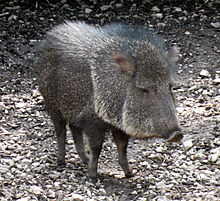Yelatáj chos woley
The yelatáj chos woley, yelataj chas woley or simply jelataj choz, is a musical bow which is characteristic of the Wichi culture in South American Gran Chaco.[1][2][3]
Features
[edit]
The Yelatáj chos woley consists of two bows of tusca wood.[1][2][3] The performer holds the end of one of the bows between his teeth and rubs that bowstring with the other.[1][3] The musician's mouth acts as a resonator.[1] Originally the bowstrings were made from peccary hair, vegetable fibers or other hair.[3] When horses arrived with the Spaniards to America, instrument makers began to use the hairs from horse manes and tails.[1][2][3]
The dimensions of one listed at Musical Instrument Museums Online (MIMO) is 350 mmm long x 60 mm wide (bowstring to bow handle).[1]
Usage
[edit]The yelatáj chos woley is for ceremonial and shamanic use.[3] The shaman is granted the power to invoke Nilataj, God of the Wichi ethnic group.[3]
References
[edit]- ^ a b c d e f "arc musical (yelat'aj chos woley)". Musical Instrument Museums Online.
- ^ a b c "Arcos musicales". Museo Virtual de Instrumentos Musicales, Instituto Nacional de Musicología. Archived from the original on 11 November 2007.
- ^ a b c d e f g Carrasco, Ruben Guaman. "LATAJCHOZ". Archived from the original on 21 February 2008.
[Photo of musician playing Yelatáj chos woley, holding one bow in his teeth and drawing the other bow across its string.]
